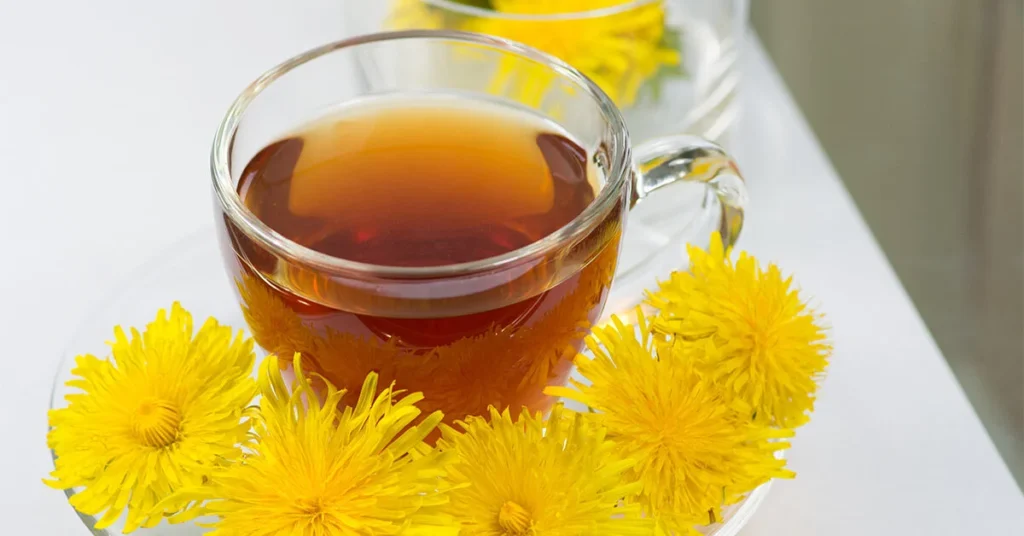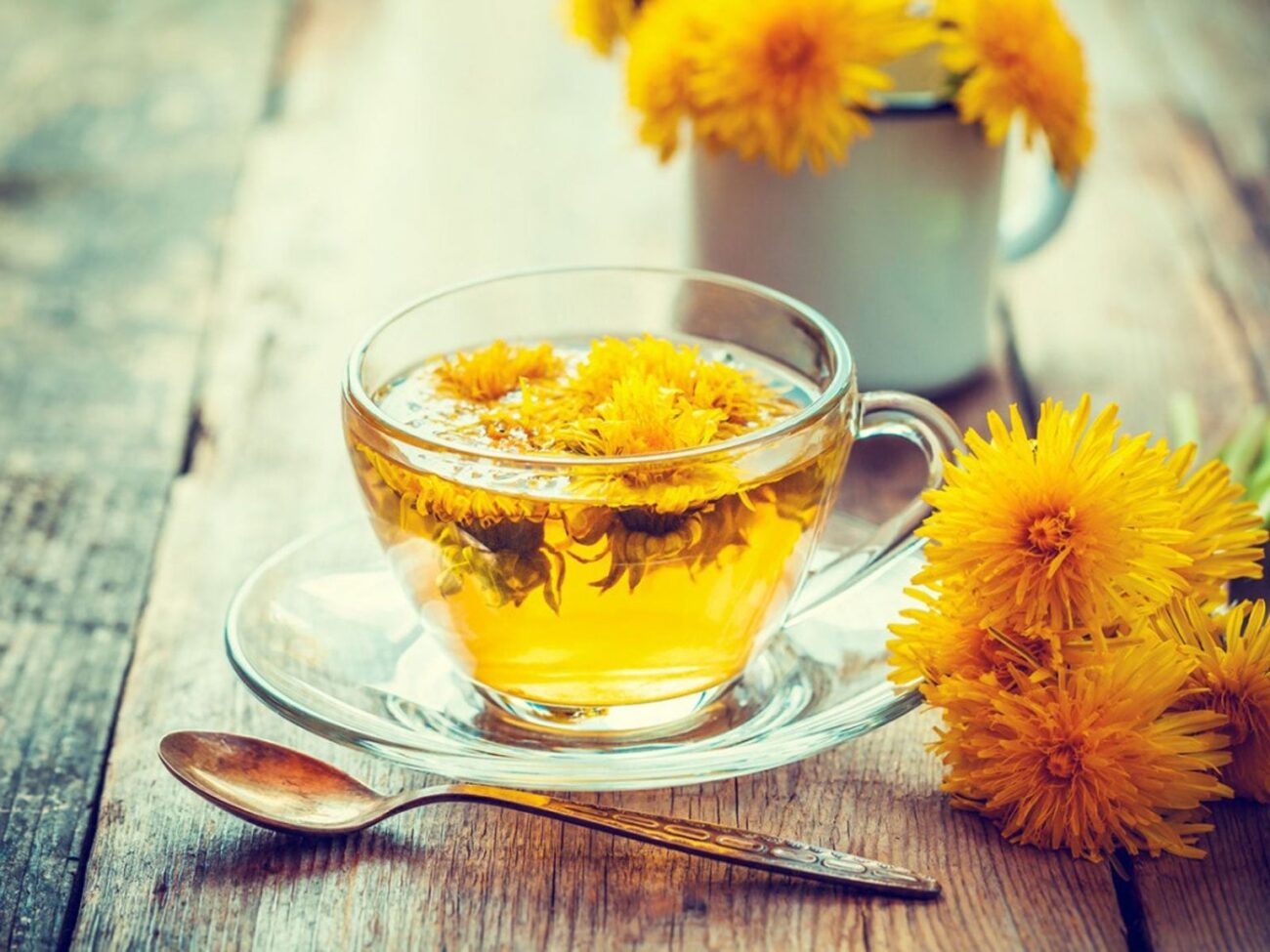Often dismissed as a pesky weed, the dandelion (Taraxacum officinale) is a powerhouse of nutrition and healing properties. Every part of this plant—from its bright yellow flowers to its roots—has been used for centuries in traditional medicine. One of the most popular ways to enjoy dandelion’s benefits is by brewing it into a soothing tea. Dandelion tea is not only delicious but also packed with health-boosting properties.
Let’s explore the benefits, uses, and potential contraindications of this underrated herbal remedy.
What is Dandelion Tea?
Dandelion tea is made from the leaves, flowers, or roots of the dandelion plant. Each part offers slightly different flavors and benefits:
- Dandelion root tea: Earthy and slightly bitter, often roasted for a coffee-like flavor.
- Dandelion leaf tea: Mildly bitter and grassy, similar to green tea.
- Dandelion flower tea: Light, floral, and subtly sweet.
This caffeine-free herbal tea is easy to make at home and is widely available in health food stores. Its versatility and health benefits make it a favorite among herbal tea enthusiasts.
Health Benefits of Dandelion Tea
- Supports Liver Health
Dandelion tea is renowned for its liver-cleansing properties. It stimulates bile production, which helps the liver detoxify the body more efficiently. This makes it a great choice for supporting liver function and promoting overall detoxification. - Aids Digestion
Dandelion tea acts as a natural diuretic, helping to flush out excess water and toxins from the body. It also stimulates digestion by increasing stomach acid and bile production, making it useful for relieving bloating, constipation, and indigestion. - Rich in Antioxidants
Dandelion is packed with antioxidants like beta-carotene and polyphenols, which help combat oxidative stress and reduce inflammation. These properties can protect your cells from damage and lower the risk of chronic diseases. - Boosts Immune System
The high levels of vitamins A and C in dandelion tea make it a great immune booster. These vitamins help strengthen your body’s defenses against infections and support overall immune health. - Promotes Healthy Skin
Dandelion tea’s detoxifying and anti-inflammatory properties can help improve skin health. It may reduce acne, eczema, and other skin conditions by clearing toxins from the body and reducing inflammation. - Supports Weight Loss
As a natural diuretic, dandelion tea can help reduce water retention and bloating. Its ability to improve digestion and metabolism also makes it a helpful addition to a weight management plan. - Regulates Blood Sugar
Some studies suggest that dandelion may help regulate blood sugar levels by improving insulin sensitivity. This makes it a potential ally for those managing diabetes or blood sugar imbalances.
How to Use Dandelion Tea
Dandelion tea can be enjoyed hot or cold, depending on your preference. Here’s how to make it:
Ingredients:
- 1-2 teaspoons of dried dandelion root, leaves, or flowers (or a tea bag)
- 1 cup of boiling water
- Honey, lemon, or ginger (optional, for added flavor)
Instructions:
- Place the dandelion root, leaves, or flowers in a tea infuser or directly in a cup.
- Pour boiling water over the dandelion and let it steep for 5-10 minutes.
- Strain the tea and add honey, lemon, or ginger if desired.
- Enjoy!
You can also experiment with blending dandelion tea with other herbs like peppermint, nettle, or chamomile for added flavor and benefits.
Contraindications and Precautions
While dandelion tea is generally safe for most people, there are a few contraindications to keep in mind:
- Allergies: If you’re allergic to plants in the Asteraceae family (like ragweed, marigolds, or daisies), you may also be allergic to dandelion.
- Pregnancy and Breastfeeding: There isn’t enough research to confirm the safety of dandelion tea during pregnancy or breastfeeding, so it’s best to avoid it or consult a healthcare provider.
- Gallbladder Issues: Dandelion stimulates bile production, which could worsen gallbladder problems in some individuals.
- Kidney Disorders: Due to its diuretic properties, dandelion tea may not be suitable for those with kidney issues.
- Medication Interactions: Dandelion may interact with certain medications, including diuretics, blood sugar medications, and antibiotics. Always consult your doctor before consuming dandelion tea if you’re on medication.

Dandelion tea is a humble yet powerful herbal remedy that offers a wide range of health benefits. From supporting liver health and digestion to boosting immunity and promoting radiant skin, this underappreciated brew is a true gift from nature. Whether you’re sipping it for its health benefits or simply enjoying its unique flavor, dandelion tea is a wonderful addition to your wellness routine. Just remember to use it mindfully and consult a healthcare professional if you have any concerns.
Have you tried dandelion tea?
Share your favorite ways to enjoy it and how it has benefited you in the comments below!

